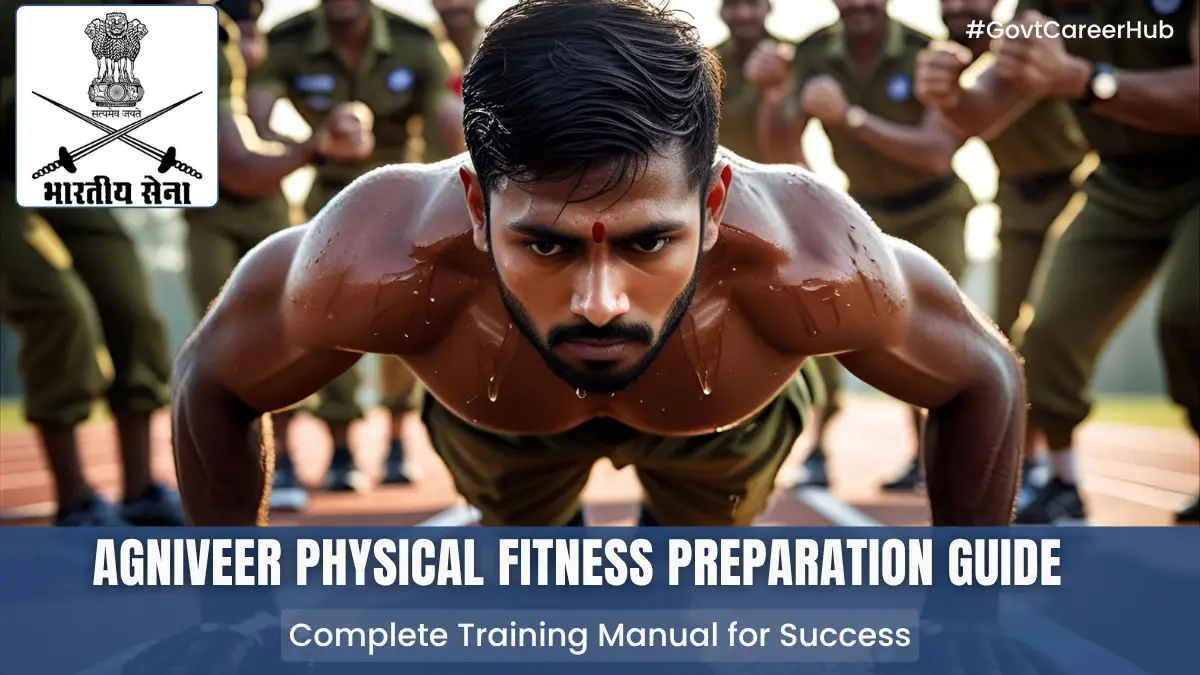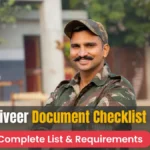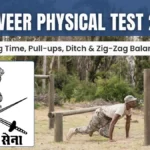Last Updated: July 24, 2025 at 5:45 pm
The Agniveer recruitment scheme has revolutionised the way young Indians join the armed forces. With its unique four-year service model, the physical fitness requirements have become more stringent than ever. Whether you’re preparing for the Army Agniveer selection, Navy Agniveer, or Air Force Agniveer positions, your physical readiness can make or break your dreams of serving the nation.
This comprehensive guide will walk you through everything you need to know about Agniveer fitness test preparation, from understanding the exact requirements to creating a foolproof training schedule that guarantees results. For complete information about Agniveer eligibility criteria, check our detailed eligibility guide.
Understanding Agniveer Physical Fitness Standards
The Agniveer scheme maintains distinct physical standards across all three services. Unlike traditional recruitment, these standards are non-negotiable and serve as the first major hurdle in your military career journey. The official fitness standards are regularly updated on the Indian Armed Forces official portal.
Army Agniveer Physical Requirements
For Army Agniveer candidates, the physical fitness test comprises several components that test your overall athletic ability:
Running Standards:
- 1.6 km run must be completed within 5 minutes 30 seconds for Group Y (Technical)
- 1.6 km run within 5 minutes 45 seconds for Group X (Tradesmen)
- Pull-ups: Minimum 10 for Group Y, 6 for Group X
- Push-ups: 40 in 2 minutes
- Sit-ups: 40 in 2 minutes
Height and Weight Standards: The height requirements vary by region, typically ranging from 157 cm to 173 cm. Weight should be proportionate to height according to the prescribed BMI charts for Indian Army. For detailed height and weight requirements by state, refer to our Agniveer physical standards guide.
Navy Agniveer Physical Standards
Naval Agniveer candidates face equally challenging requirements. The Indian Navy recruitment portal provides the most updated standards:
Fitness Parameters:
- 1.6 km run: 7 minutes maximum
- Push-ups: 15 minimum
- Sit-ups: 20 minimum
- Swimming: 25 metres (compulsory for certain branches)
Air Force Agniveer Requirements
The Indian Air Force maintains specific standards for different trades:
Basic Fitness Test:
- 1.6 km run: 6 minutes 30 seconds
- Push-ups: 10 minimum
- Sit-ups: 15 minimum
- Chin-ups: 3 minimum
Creating Your Agniveer Fitness Training Schedule
Success in Agniveer physical tests requires systematic preparation spanning at least 12-16 weeks. Here’s a proven training methodology that has helped thousands of candidates achieve their fitness goals.
Phase 1: Foundation Building (Weeks 1-4)
During the initial phase, focus on building your cardiovascular base and developing proper exercise form.
Daily Routine:
- Morning: 30-minute brisk walk or light jogging
- Evening: Basic bodyweight exercises (modified push-ups, assisted pull-ups, crunches)
- Rest days: Twice per week for muscle recovery
Key Focus Areas:
- Develop running endurance gradually
- Master correct push-up and pull-up techniques
- Build core strength foundation
- Establish consistent sleep and nutrition patterns
Phase 2: Strength Development (Weeks 5-8)
This phase concentrates on building the muscular strength required for pull-ups, push-ups, and sustained running performance.
Training Split:
- Monday/Wednesday/Friday: Upper body strength (pull-ups, push-ups, dips)
- Tuesday/Thursday/Saturday: Lower body and running (interval training, hill runs)
- Sunday: Active recovery (light stretching, walking)
Progressive Overload: Gradually increase repetitions and running distances. If you can only do 2 pull-ups initially, aim for 3-4 by week 6, and 6-8 by week 8.
Phase 3: Performance Optimisation (Weeks 9-12)
The final phase focuses on achieving and exceeding the minimum standards while maintaining peak performance levels.
Intensive Training Protocol:
- 1.6 km time trials twice weekly
- Maximum repetition tests for push-ups and pull-ups
- Combined circuit training sessions
- Mental preparation and stress management techniques
Essential Exercises for Agniveer Success
Cardiovascular Endurance Training
Interval Running Method: This proven technique improves both speed and endurance simultaneously.
- Warm-up: 5-minute easy jog
- Main workout: 400m fast pace, 200m recovery (repeat 6-8 times)
- Cool-down: 5-minute walk with stretching
Long Distance Base Building:
- Weekly long runs starting at 3 km, progressing to 8-10 km
- Maintain conversational pace throughout
- Focus on consistent breathing rhythm
Upper Body Strength Development
Pull-up Progression System: Many candidates struggle with pull-ups. Here’s a systematic approach:
- Negative Pull-ups: Jump to the top position, lower yourself slowly
- Assisted Pull-ups: Use resistance bands or partner assistance
- Dead Hangs: Build grip strength by hanging from the bar
- Partial Range: Perform half pull-ups to build strength
Push-up Variations:
- Standard push-ups for chest and tricep development
- Diamond push-ups for tricep emphasis
- Wide-grip push-ups for chest development
- Incline push-ups for beginners
Core Strengthening Routine
A strong core improves performance in all physical activities:
Daily Core Circuit:
- Plank hold: 30-60 seconds
- Bicycle crunches: 20 each side
- Russian twists: 30 repetitions
- Mountain climbers: 20 each leg
- Dead bug exercise: 10 each side
Nutrition Guidelines for Agniveer Candidates
Physical training alone isn’t sufficient. Your nutrition strategy plays a crucial role in achieving optimal fitness levels.
Pre-Training Nutrition
2-3 Hours Before Training:
- Complex carbohydrates: Brown rice, oats, or whole wheat bread
- Lean protein: Eggs, chicken breast, or paneer
- Moderate healthy fats: Nuts or olive oil
30-60 Minutes Before:
- Light snack: Banana with a small amount of honey
- Adequate hydration: 300-500ml water
Post-Training Recovery
Within 30 Minutes:
- Protein-carbohydrate combination: Chocolate milk, protein shake with fruit
- Hydration replacement: Water with electrolytes
2-3 Hours Post-Training:
- Complete meal with all macronutrients
- Focus on muscle recovery foods: Fish, chicken, lentils, quinoa
Daily Nutritional Requirements
Macronutrient Distribution:
- Carbohydrates: 45-55% of total calories
- Proteins: 25-30% of total calories
- Fats: 20-25% of total calories
For detailed nutrition planning, consult the Indian Council of Medical Research dietary guidelines
Essential Foods for Military Fitness:
- Lean proteins: Chicken, fish, eggs, legumes
- Complex carbs: Brown rice, oats, sweet potatoes
- Healthy fats: Nuts, seeds, avocado
- Micronutrient-rich foods: Green vegetables, fruits, dairy
Common Training Mistakes to Avoid
Overtraining Syndrome
Many enthusiastic candidates train too hard, too soon, leading to injuries and burnout.
Warning Signs:
- Persistent fatigue despite adequate rest
- Declining performance in successive workouts
- Increased susceptibility to minor illnesses
- Loss of motivation for training
Prevention Strategy:
- Follow the 10% rule: Increase weekly training volume by maximum 10%
- Include mandatory rest days in your schedule
- Listen to your body’s feedback signals
Neglecting Recovery
Recovery is when your body adapts and becomes stronger.
Recovery Essentials:
- 7-9 hours of quality sleep nightly
- Proper hydration throughout the day
- Active recovery activities on rest days
- Stress management techniques
Inadequate Preparation Time
Starting preparation too late is a common mistake that leads to suboptimal performance.
Optimal Timeline:
- Minimum 12 weeks for moderately fit individuals
- 16-20 weeks for beginners or those significantly out of shape
- Additional time for technique refinement and mental preparation
Mental Preparation Strategies
Physical fitness alone doesn’t guarantee success. Mental toughness during the actual tests is equally important.
Visualisation Techniques
Performance Visualisation:
- Mentally rehearse each component of the physical test
- Visualise yourself achieving the required standards
- Practice positive self-talk during challenging moments
Stress Management
Test Day Anxiety Control:
- Deep breathing exercises
- Progressive muscle relaxation
- Positive affirmations and goal reminders
Building Mental Resilience
Confidence Building Activities:
- Regular practice tests under simulated conditions
- Gradual exposure to increasing difficulty levels
- Celebrating small improvements and milestones
Sample Weekly Training Schedule
Here’s a practical weekly schedule that balances all aspects of Agniveer fitness preparation:
Monday – Upper Body Focus
- Warm-up: 10-minute light cardio
- Pull-up progression: 4 sets
- Push-ups: 4 sets to near failure
- Dips: 3 sets
- Core circuit: 15 minutes
- Cool-down and stretching: 10 minutes
Tuesday – Running and Lower Body
- Dynamic warm-up: 10 minutes
- Interval running: 1.6 km time trial or speed work
- Squats and lunges: 3 sets each
- Calf raises: 3 sets
- Hip mobility work: 10 minutes
Wednesday – Circuit Training
- Full-body warm-up: 10 minutes
- Circuit: Push-ups, pull-ups, squats, planks (3 rounds)
- Running: 30-minute steady pace
- Flexibility training: 15 minutes
Thursday – Endurance Focus
- Long run: 45-60 minutes at comfortable pace
- Walking recovery: 10 minutes
- Light stretching and foam rolling
Friday – Strength and Power
- Upper body strength training
- Plyometric exercises: Jump squats, burpees
- Sprint intervals: 100m x 8 with full recovery
- Core strengthening
Saturday – Practice Test
- Complete simulation of actual physical test
- Time all components and record results
- Identify areas needing improvement
Sunday – Active Recovery
- Light activities: Walking, swimming, yoga
- Meal preparation for the upcoming week
- Mental relaxation and motivation building
Injury Prevention and Management
Injuries can derail your Agniveer preparation. Here’s how to stay healthy throughout your training:
Common Training Injuries
Overuse Injuries:
- Shin splints from excessive running
- Shoulder impingement from repetitive pull-ups
- Lower back strain from improper exercise form
Prevention Strategies:
- Proper warm-up before every session
- Gradual progression in training intensity
- Correct exercise technique over maximum repetitions
- Adequate rest between high-intensity sessions
Early Intervention
RICE Protocol for Minor Injuries:
- Rest: Avoid aggravating activities
- Ice: Apply for 15-20 minutes every 2-3 hours
- Compression: Use elastic bandages for support
- Elevation: Raise injured area above heart level
When to Seek Professional Help
Consult a sports medicine specialist if you experience:
- Pain that persists beyond 48-72 hours
- Significant swelling or loss of function
- Recurring injuries in the same area
- Any injury that prevents normal training
The Sports Authority of India provides resources for sports medicine and injury prevention. Additionally, check our fitness injury prevention guide for more detailed information.
Final Preparation Tips
As you approach your Agniveer physical test date, these final tips can make the difference between success and disappointment:
Last Two Weeks Strategy
Training Adjustments:
- Reduce training volume by 30-40%
- Maintain training intensity but with longer recovery
- Focus on technique refinement over building fitness
- Practice complete test simulations 2-3 times
Test Day Preparation
24 Hours Before:
- Light training session with dynamic movements
- Carbohydrate loading with familiar foods
- Early bedtime for optimal rest
- Equipment check and preparation
Test Day Morning:
- Familiar breakfast 2-3 hours before reporting
- Adequate hydration without overdoing it
- Dynamic warm-up routine
- Positive mental state and confidence building
Equipment and Logistics
Essential Items:
- Proper running shoes (broken in, not new)
- Comfortable athletic wear suitable for all exercises
- Towel and extra clothing
- Water bottle and light snacks for after the test
Conclusion
Success in Agniveer physical fitness tests requires dedication, systematic preparation, and intelligent training. The standards are challenging but absolutely achievable with the right approach and sufficient preparation time.
Remember that this journey is not just about meeting minimum requirements—it’s about developing the physical and mental toughness that will serve you throughout your military career. The habits you build during this preparation phase will become the foundation of your success as an Agniveer.
Start your preparation today, follow this guide consistently, and join the ranks of proud Agniveers serving our great nation. Your dedication to physical fitness is your first step towards a rewarding military career.
The path may be challenging, but every push-up, every kilometre run, and every drop of sweat brings you closer to wearing the uniform with pride. Stay committed, train smart, and success will surely follow.
Frequently Asked Questions (FAQs)
These articles might be helpful:
- Agniveer Physical Test 2025: Running Time, Pull-ups, Ditch & Zig-Zag Balance Tips
- Documents Required for Agniveer Application 2025: A Complete Checklist
- Indian Army Agniveer Selection Process 2025: Step-by-Step Guide
- What is Agniveer Scheme? Full Details About Agnipath Yojana for Defence Aspirants
Stay updated with the latest Agniveer recruitment notifications and preparation tips on GovtCareerHub.com – your trusted partner in government career preparation.





